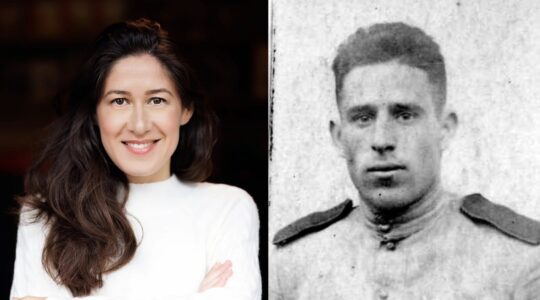Israel’s new Interior minister for five months has declined to carry out a cabinet decision that would speed up the emigration of the Falash Mura from Ethiopia, their advocates claim.
This week Avraham Poraz, who succeeded Eli Yishai in March as head of the ministry, must tell the Supreme Court why.
An Israeli law firm last month brought suit in the Supreme Court against Poraz compelling him to enforce the cabinet resolution.
A response to the suit is due on July 30, but the case may be delayed, the plaintiffs’ lead attorney said. Omri Kaufman also said the Falash Mura, Ethiopians with Jewish roots whose relatives converted to Christianity a century ago, may continue to live (and in increasing numbers, die) in Ethiopia.
"We suspect that the attorney general [who represents the Interior Ministry] will take more time," possibly not issuing a response until mid-September, Kaufman said.
The suit, the latest in a series filed in recent years as part of an advocacy campaign that includes lobbying by American Jewish groups, debates by Israeli politicians and rallies by Ethiopian immigrants, comes at a time of growing concern over reports that impoverished Falash Mura are dying because of inadequate medical care.
About 19,000 Falash Mura live in Addis Ababa, Ethiopia’s capital, and in the northern Gondar region awaiting permission to immigrate to Israel. Some 200 to 250 per month have made aliyah for the last dozen years, since the Operation Moses airlift that brought 14,000 Ethiopian Jews to Israel in a 36-hour period.
Because of the Falash Mura’s involvement with Ethiopia’s dominant Christian culture, doubts arise about the legitimacy of their wishes to return to Judaism and settle in Israel. But Rabbi Shlomo Amar, the newly elected Sephardic chief rabbi, estimated that 90 percent of the Falash Mura qualify as Jews according to Jewish law and he issued a letter recently urging "the rapid implementation of the government’s [February] decision." Rabbi Amar had dispatched a personal emissary to Ethiopia last year.
According to the cabinet resolution, the Interior Ministry, which determines the eligibility of potential olim, was to investigate the Jewish background of the remaining Falash Mura. That policy had the support of Yishai, from the Shas party.
But Poraz, from the Shinui party, has not ordered the investigations to be conducted, citing the potential cost of a widespread Ethiopian aliyah. He estimated that it would cost nearly $25 million per 1,000 Falash Mura, a higher figure than among olim from Western countries who require a less extensive indoctrination to Israeli society, most of the time in government-supported absorption centers.
The pro bono suit by the Tel Aviv law firm Goldfarb Levy Eran, on behalf of 379 Falash Mura still in Ethiopia, and the New York-based Struggle to Save Ethiopian Jewry asks the Supreme Court to have Poraz carry out his duties or have the government circumvent the Interior Ministry to facilitate the Falash Mura’s aliyah.
"Nothing has been done" since Poraz took office, Kaufman said. "The decision of the government was very explicit.
"We feel very strongly about our legal claims," he said. "If the court addresses the legal aspects, there is no way it can but implement the [cabinet] decision."
Even if the court considers the suit’s political or economic implications and rules in Poraz’s favor, publicity over the suit "will put some pressure on important places" in Israeli society to speed up the Falash Mura aliyah, Kaufman said.
The recent suit follows three others heard last month by the Supreme Court. One is a contempt of court motion for the Interior Ministry’s failure to conduct the interviews of Falash Mura; the other two would require the government to treat the Falash Mura as Jews according to the Law of Return.
In his public statements, Poraz has also cast doubt on the Jewish status of the Falash Mura.
Poraz did not return phone calls and e-mail messages from The Jewish Week seeking his comments on the case.
"It’s a political thing in Israel," said a New York activist who visited the Falash Mura in Ethiopia two years ago and spoke on the condition of anonymity. The Falash Mura, poor and unskilled, are seen as less desirable newcomers than olim from wealthy, technologically advanced lands, the activist said. "If they weren’t poor and black, they’d be in Israel."
Another activist said, Poraz is not interested in poor Jews. Money is basically an excuse. "Israel in the 1940s was in worse economic shape and brought in hundreds of thousands of refugees. If money were really the issue, why wouldn’t Poraz turn to the UJC [United Jewish Communities, umbrella group of Jewish communities in the U.S.] for money?"
As part of the cabinet resolution, the Interior Ministry was authorized to request additional funds for the Falash Mura from the UJC, but Poraz reportedly has not done so.
A spokesman for UJC could not verify whether the Interior Ministry had asked for additional funds for Falash Mura aliyah.
Poraz also has not appointed members of a ministerial committee on the Falash Mura, another obligation of the cabinet resolution.
"Poraz opposes the [cabinet] decision,’ said Shlomo Molla, the Jewish Agency’s senior consultant for Ethiopian immigrants. The Jewish Agency coordinates immigrants’ aliyah, but does not act until the Interior Ministry rules who is eligible to come, he said.
Ethiopian-born Avraham Neguise, founder of the South Wing to Zion advocacy group, says Poraz is "practicing discrimination against the Ethiopian Jews."
"He doesn’t want to bring poor people here," Neguise said.
He said 12 Falash Mura, most of them children (part of the group that has not yet been ruled Jewish by the Interior Ministry) died last month.
"The JDC [American Jewish Joint Distribution Committee] refused to give them medical treatment," Neguise said.
The JDC, which runs clinics in Addis Ababa and Gondar, reserves its care for people certified as Jewish by the Interior Ministry, in effect denying aid to some 5,000 people.
Will Recant, assistant executive vice president of JDC, says its medical facilities in Addis Ababa "has maintained … the same level of service since 1991," which is to limit its non-emergency services to people certified as Jewish by the Interior Ministry in consultation with Falash Mura authorities. The 5,000 outside of the agency’s scope have not begun the application process with the Interior Ministry, Recant says.
He was not aware of the circumstances under which the Ethiopians who reportedly were denied medical treatment and subsequently died approached the JDC clinics, but says anyone who appears to be in "critical" condition will be helped.
Ethiopia, one of the world’s poorest nations, is in the midst of a food crisis and millions of people "are now on the edge of death," Prime Minister Meles Zenawi recently declared.
"In Ethiopia the situation is very difficult," Neguise said, especially among the Falash Mura who have left their farms to await aliyah in the capital or Gondar. "They are not working."
Some receive limited financial aid from relatives already in Israel. Some of the others compete for work on construction sites or other low-paying jobs.
"Most of them," Neguise said, "are begging on the street."
The New York Jewish Week brings you the stories behind the headlines, keeping you connected to Jewish life in New York. Help sustain the reporting you trust by donating today.




